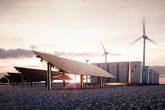CGG joins UK consortium project assessing ecosystem impact of offshore wind farms
Published by Abi Larkin,
Editorial Assistant
Energy Global,
CGG is acting as a special technical partner in a consortium research project led by Bangor University to identify opportunities that benefit biodiversity and the conservation of species around offshore wind farms whilst also supporting wind farm developers to design long-term environmental monitoring strategies. The project will utilise data supplied by Mona Offshore Wind Ltd (a joint venture between EnBW and bp), ENI, Ørsted, RWE, and The Met Office, among others. The £2 million, four-year ECOWind-ACCELERATE project is funded by the UK Natural Environment Research Council (NERC) and The Crown Estate, with support from the Department for Environment, Food, and Rural Affairs (Defra) as part of the ECOWind programme.
CGG will provide high-performance computing resources, from its global capacity of 310 petaflops, for complex climate and sediment transport modelling to determine the impact of offshore wind farms and climate change in the East Irish Sea. In addition, CGG will provide machine learning (ML) expertise drawing on experience from previous research projects with Bangor University on the use of ML for automated species identification, substrate, and habitat classification in the Irish Sea to map benthic habitats, natural capital, and biodiversity net gain/loss in this area. Analysis of seabed properties including grain characterisation, mineralogy, geochemistry, and meiofaunal surveys will be performed by CGG’s Geoscience Laboratories to ground-truth ML and substrate mapping data. Finally, CGG’s Environmental Science subject matter experts will analyse the impact of offshore wind farms on fish behaviour and the interaction between seabed habitat, predator and prey interactions, and prey availability.
Professor David Viner, Head of Environmental Science, CGG, said: “CGG is committed to supporting the energy transition needed to address the climate crisis. Our growing Environmental Science team is playing a central role in combining environmental, climate, earth, and data science coupled with our HPC expertise to a wide range of clients. With the deployment of offshore renewable energy accelerating, it is important to optimise the potential of the marine environment solution for renewable energy and critical to understand and safeguard the ecosystem. The aim of this research is to deliver an understanding of how offshore wind deployment will affect the seabed and the wider marine ecosystem. CGG will have an important role to play by providing key resources, including subject matter expertise, HPC, and advanced technology to improve data resolution and analytics to enable our partners to harness renewable energy in an environmentally-responsible manner.”
For more news and technical articles from the global renewable industry, read the latest issue of Energy Global magazine.
Energy Global's Summer 2022 issue
The Summer 2022 issue of Energy Global hosts an array of technical articles focusing on wind, solar, biofuels, green hydrogen, geothermal, and more. This issue also features a regional report discussing the outlook for renewables in the US.
Read the article online at: https://www.energyglobal.com/wind/16092022/cgg-joins-uk-consortium-project-assessing-ecosystem-impact-of-offshore-wind-farms/
You might also like
Infinigen Renewables announces solar+battery storage project in Puerto Rico
Infinigen Renewables and ArcLight Capital Partners have announced a 15 MW storage project paired with a 32 MW solar project in the Yabucoa Municipality of Puerto Rico.

